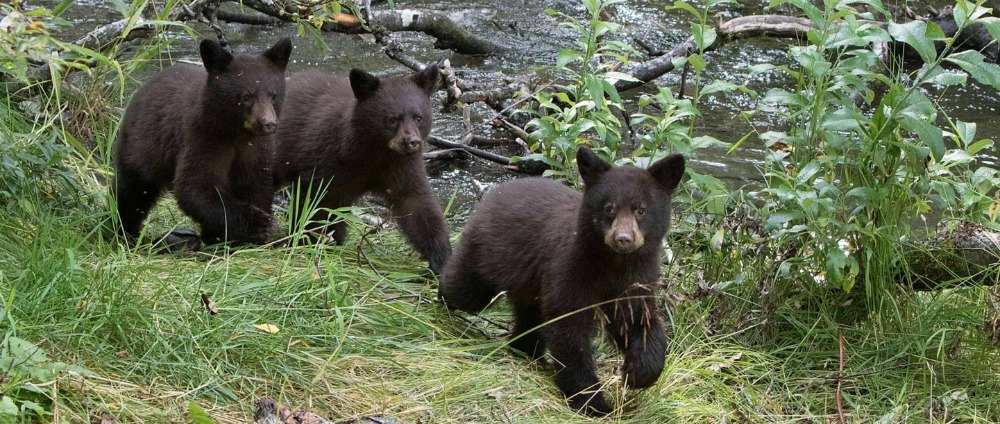Bear Information

Black bears can be seen in all elevations of the Great Smoky Mountains National Park and the surrounding areas. With approximately 1,500 bears in the park, the population density is roughly two bears per square mile. With our proximity to the National Park, black bears are a part of our life in Laurel Valley. We love our bears and delight in their antics most of the time. When the occasional nuisance bear emerges, everyone agrees it is less of a bear problem and more a people problem. Education, and a few simple guidelines are critical.
Never, ever feed black bears either on purpose or by accident. Black bears and people live close together in Laurel Valley. It is important for people to do what they can to make sure that black bears stay wild and that they do not get food from people. Bears can smell extremely well, and their sense of smell may lead them into your yard in search of food. Black bears will try to eat your garbage, birdseed or pet food if it is available in your yard.
Learning about bears will prevent negative interactions and dispel unfounded fears. Distinguishing nervous behaviors (like huffing or jaw popping) from inquisitive ones (like standing up to get a good whiff of something interesting) can help make encounters positive.
A wonderful local resource for learning more about black bears and how to live with them is the Appalachian Bear Rescue (ABR) Visitor and Education Center at Trillium Cove in Townsend. BearWise is a wonderful website with a wealth of information that was developed by bear experts from the Southeastern states and is supported by SEAFWA, the Southeastern Association of Fish and Wildlife Agencies.
You Can Keep Bears Wild
Black bears have a natural distrust of humans, are shy, and usually avoid people. However, bears may be attracted to food sources in residential areas.
- Remove the bird feeders. It is best not to put out food for birds from April–November. Instead, plant native seed-bearing plants or use water features to attract birds to your home.
- Secure your garbage. Store garbage indoors, in a shed or garage, or in a bear-proof container. Put garbage out on the morning of pickup, not the night before, or take it to the dump frequently.
- Pick up pet food. Feed pets only what they will eat in a single feeding or feed them indoors. Remove all uneaten food. Do not leave food out overnight.
- Do not put meat scraps in the compost pile. Keep compost away from house.
- Pick up and remove ripe fruit from fruit trees and surrounding grounds.
- Clean the grill often. Do not dump drippings in your yard. Run the grill an extra 5 minutes to burn off grease.
- Install electric fencing to protect beehives, dumpsters, gardens, compost piles, or other potential food sources.
- Don’t store food, freezers, refrigerators, or trash on porches.
- Use harassment techniques in conjunction with removing the attractant to get the bear to move off your property. Air horns, bells, banging pots and pans or simply clapping loudly are a great tool for deterring black bears. Paintballs are a good tool for hazing aggressive bears. They are nonlethal, won’t harm the bear if shot at the rump, but are painful enough to get the bear moving away from homes.
- Talk to your neighbors. Make sure your neighbors and Laurel Valley vacation guests are aware of the ways to prevent bears from causing problems.
- Learn about black bears!
Interactions with Black Bears
Black bears are shy of humans and will not attack unless provoked. That’s not to say very rare attacks don’t happen. They have -- and some have been tragic -- but you are much more likely to be attacked by a dog, bee or person than you are a black bear. According to the US Forest Commission, you should never approach, feed, surround or corner a black bear. If their behavior changes, you have gotten too close.
- Respect the bear’s space. If you see a bear, enjoy watching from a distance. If you come into close contact, back away slowly and remember that bears have a natural distrust of humans and will run when given a safe escape route. If it is up a tree, leave it alone. Keep people and pets away from the tree to allow the bear to leave your property.
- Let the bear know it is not welcome. Often a bear in your yard is just passing through and, if it finds no food, will simply move on. Don’t allow the bear to feel comfortable in your yard. After ensuring the bear has an escape route, make lots of noise to encourage it to leave. Remove any non-natural foods that attracted the bear.
- Report unresolved problems or damage. If you experience a severe bear problem after taking appropriate steps of prevention, or particularly aggressive bear behavior, you may seek additional assistance by contacting Tennessee Wildlife Resource Agency (TWRA) at (800) 832-6322.
| File | Uploaded | |
|---|---|---|
Pages
- Home
- Architectural Review - Mandatory
- Bear Information
- Firewise in Laurel Valley
- Firewise
- Fire Safety Guidelines
- Laurel Valley Emergency Evacuation
- Main Entrance
- Entrance & Security
- Emergency Contacts & Local Links
- Dues & Title Transfers
- In and Around Laurel Valley
- Laurel Valley Map
- Local Attractions - Links
- Property Rental
- Rentals in Laurel Valley
- Roads & Snow Removal
- Snow & Ice Response Policy
- General Roads & Weather FAQ
- Waste Disposal
- Trash Compactor Operation
- Recycling
- LVPOA Board Meeting Minutes
- Restrictions & By-Laws
- Restrictions
- Amendment to By-Laws 10/2022
- By-Laws as Revised December 11, 201
- Resolution - Certificate of Dues
- LVPOA Forms & Documents
- Contact the LVPOA
- Contact the LVPOA
- Registration Instructions

